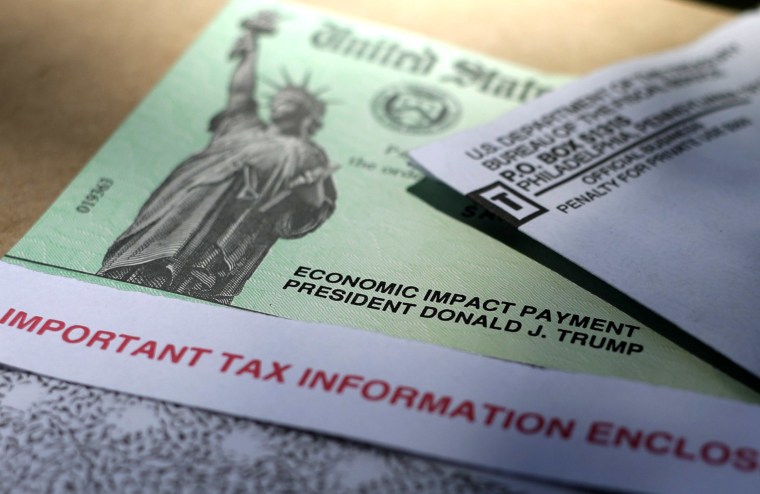WASHINGTON — House Democratic leaders are pushing for another round of stimulus payments of up to $1,200 per person in new coronavirus relief legislation that's headed for a vote Friday.
The eligibility criteria in the HEROES Act are similar to those in the first round approved in late March, with some expansions.
The legislation would provide up to $1,200 in payments (or $2,400 for married couples), with an extra $1,200 per dependent up to a maximum of three.
The income thresholds are the same as in the CARES Act, with money for people making up to $99,000 and couples up to $198,000. The amount would start to reduce from $1,200 above thresholds of $75,000 and $150,000, respectively.
House Speaker Nancy Pelosi, D-Calif., said Tuesday that for many Americans, the new direct payments are "necessary for their survival" and that they would serve as a "stimulus to the economy."
The legislation makes all dependents eligible for the extra $1,200, rather than just children younger than 17. That includes households with full-time students younger than 24 and adult dependents. People who are overdue on child support would not lose their payments, which were garnished in the first round, and the money would not be subject to transfer to pay debts.
The legislation would remove the CARES Act's requirement of a Social Security number, meaning immigrants who file returns with a taxpayer identification number (or TIN) could get money.
Full coverage of the coronavirus outbreak
As under the CARES Act, the direct deposits or checks would be based on 2019 tax returns. For those who haven't filed yet, they would be based on 2018 returns. Seniors who are on Social Security would also get benefits based on information on file, and other non-filers would be able to apply.
The $3 trillion legislation would also include funding for:
- Extending the $600-per-week unemployment benefits in CARES 2 through January.
- Nearly $1 trillion in aid to state and local governments.
- Hazard pay for some essential workers.
- Expanding coronavirus testing, contract tracing and treatment.
- Enhancing tax credits for employers to keep workers on their payrolls.
- Providing full COBRA subsidies for those who lost their employer-provided health care coverage.
- Additional money for the U.S. Postal Service.
- Support to help renters and homeowners make monthly rent, mortgage and utility payments.
The 1,815-page legislation is likely headed for a vote in the Democratic-led House on Friday. But its prospects in the Republican-run Senate are far from certain.
Michael Zona, a spokesman for Senate Finance Committee Chairman Chuck Grassley, R-Iowa, called the overall legislation "DOA in the Senate," although he didn't comment specifically on the stimulus money.
"Sen. Grassley will work with his colleagues on Phase 4 legislation if it becomes necessary," Zona said in an email. "It's too early to say what that legislation might encompass. It would need to address any ongoing problems in an effective manner."
Download the NBC News app for full coverage and alerts about the coronavirus outbreak
A summary from House Democratic leaders said the cash would act as "cushioning the economic blow of the coronavirus crisis with a second round of more substantial economic impact payments."
The first round of payments provided a lifeline to many people struggling during the pandemic. The new Democratic-led bill comes as the coronavirus continues to ravage the economy with mass shutdowns that have led about 33 million Americans out of work to file for jobless benefits.

